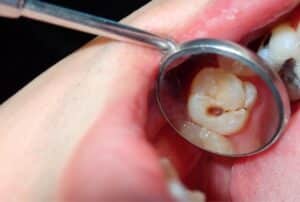A Guide to Preventing Cavities for Every Age
 Maintaining a healthy smile is essential for everyone, no matter their age. Dental cavities, also known as dental caries, are a common problem affecting people of all ages. This comprehensive guide to preventing cavities for every age, will explore what causes cavities and provide age-specific tips to help you prevent them. Understanding the root causes and implementing preventive measures can safeguard your oral health throughout your life.
Maintaining a healthy smile is essential for everyone, no matter their age. Dental cavities, also known as dental caries, are a common problem affecting people of all ages. This comprehensive guide to preventing cavities for every age, will explore what causes cavities and provide age-specific tips to help you prevent them. Understanding the root causes and implementing preventive measures can safeguard your oral health throughout your life.
Understanding Cavities: Causes and Risk Factors
Before we dive into prevention strategies, let's understand what causes cavities and the factors that increase the risk of developing them. Knowing these crucial details enables you to make informed decisions to protect your teeth.
The Role of Plaque
Plaque is a sticky film of bacteria that forms on our teeth. When we eat foods high in sugar or starch, the bacteria in plaque produce acids that attack the enamel, the protective layer of our teeth. Over time, these acid attacks can lead to cavities.
Sugar and Its Impact on Dental Health
Sugar is one of the main culprits behind cavities. Sugary snacks and drinks provide food for the bacteria in plaque, causing them to produce more damaging acids. Cutting down on sugary treats can go a long way in protecting your teeth.
Importance of Oral Hygiene
Good oral hygiene is essential in preventing cavities. Regular brushing, flossing, and using mouthwash help remove plaque and food particles, reducing the risk of cavities. Brush your teeth at least twice a day, and remember to floss!
Risk Factors for Cavities
Certain factors can increase the likelihood of cavities, such as age, dry mouth, frequent snacking, and  lack of fluoride exposure. Understanding these risk factors can help you tailor your preventive efforts accordingly.
lack of fluoride exposure. Understanding these risk factors can help you tailor your preventive efforts accordingly.
Preventing Cavities at Different Ages
Now that we know the causes and risk factors for cavities, let's delve deeper into age-specific prevention tips to ensure optimal oral health at every stage of life.
Preventing Cavities in Toddlers and Young Children
Early dental care sets the foundation for a lifetime of healthy smiles. Here are some additional age-specific tips for preventing cavities in toddlers and young children:
- Supervise Brushing: Young children may need more dexterity to brush their teeth effectively. As a parent or caregiver, it's essential to supervise and assist them until they can brush independently.
- Avoid Juice in Bedtime Bottles: Putting juice or sugary beverages in bedtime bottles can lead to prolonged exposure to sugars, increasing the risk of cavities. Stick to water in bedtime bottles or transition to a sippy cup.
- Limit Sippy Cup Use: While sippy cups are convenient, using them too often can lead to constant sipping throughout the day. This constant exposure to sugars can contribute to cavity formation. Encourage using regular cups as soon as your child is ready.
Preventing Cavities in Children and Preteens
 As children grow, their dental needs change. Here are some additional age-specific tips for preventing cavities in children and preteens:
As children grow, their dental needs change. Here are some additional age-specific tips for preventing cavities in children and preteens:
- Encourage Proper Brushing Techniques: Teach your child the correct way to brush their teeth, including brushing all surfaces and spending at least two minutes each time.
- Promote Healthy Snacks: Offer nutritious snacks like fruits, vegetables, cheese, and yogurt. Limit sugary snacks and opt for whole foods that support dental health.
- Educate on the Dangers of Tobacco and Vaping: As children approach their teenage years, they may be exposed to tobacco products or vaping. Educate them about the harmful effects of these substances on oral and overall health.
Preventing Cavities in Teens and Young Adults
Teenagers and young adults face unique challenges when it comes to oral health. Here are some additional age-specific tips for preventing cavities in this group:
- Sports Mouthguards: If your teenager participates in contact sports or activities with a risk of dental injury, consider getting a custom-fitted mouthguard to protect their teeth from damage.
- Address Bruxism: Some teenagers may develop bruxism, teeth grinding or clenching during sleep. If this is an issue, discuss it with their dentist, as it can lead to dental problems.
Preventing Cavities in Adults
Maintaining oral health becomes even more critical as we age. Here are some additional tips for preventing cavities in adults:
- Monitor Medications: Some medications can cause dry mouth, which increases the risk of cavities. Talk to your healthcare provider about adjusting medications if dry mouth concerns you.
- Protect Teeth from Grinding: If you grind your teeth or clench your jaw, consider wearing a nightguard to protect your teeth from excessive wear and potential cavities.
- Stay Informed on Oral Health: Stay informed about the latest developments in oral health and dental care. Attend regular dental checkups to receive updates and personalized advice from your dentist.
Preventing Cavities in Seniors
Oral health is essential for seniors' overall well-being. Here are some additional age-specific tips for cavity prevention in seniors:
- Consider Fluoride Treatments: Some seniors may benefit from fluoride treatments to strengthen tooth enamel and reduce the risk of cavities. Discuss this option with your dentist.
- Denture Care: If you wear dentures, maintain proper denture hygiene and schedule regular checkups with your dentist to ensure an appropriate fit and avoid oral health issues.
- Address Gum Recession: Aging can lead to gum recession, exposing the tooth roots to decay. Be diligent with oral hygiene, and consider gum grafts if necessary.
Additional Tips for Maintaining Excellent Oral Health
While age-specific prevention is crucial, some general tips can benefit everyone in maintaining excellent oral health:
- Brush Properly
Brush your teeth at least twice a day for two minutes each time. Use a soft-bristled toothbrush and fluoride toothpaste. Be gentle when brushing to avoid damaging your gums and enamel.
- Floss Regularly
Flossing helps remove plaque and food particles between your teeth and below the gumline, which toothbrushes can't reach. Make flossing a part of your daily oral hygiene routine.
- Limit Sugary and Acidic Foods
Cut down on sugary snacks, beverages, and acidic foods that can erode tooth enamel. If you do indulge, rinse your mouth with water afterward to minimize the impact on your teeth.
- Use Fluoride Mouthwash
Rinsing with fluoride mouthwash can provide extra protection for your teeth. It helps strengthen enamel and reduces the risk of cavities.
- Drink Plenty of Water
Water keeps you hydrated and helps wash away food particles and bacteria in your mouth. It's an excellent way to maintain saliva production, which is essential for neutralizing acids and protecting your teeth.
- Chew Sugarless Gum
Chewing sugarless gum after meals can stimulate saliva flow and help clean your teeth. Look for gum with xylitol, as it has been shown to have additional cavity-fighting properties.
- Avoid Smoking and Chewing Tobacco
Tobacco use is harmful to your oral health and can increase the risk of cavities, gum disease, and oral cancer. If you use tobacco, consider quitting for your overall health.
- Stay Hydrated
Dry mouth can increase the risk of cavities, so stay hydrated throughout the day. Drink water and limit caffeine and alcohol, which can contribute to dehydration.
- Be Mindful of Dental Products
Choose dental products, including toothpaste and mouthwash, that contain fluoride and have the American Dental Association (ADA) seal of approval. These products have undergone rigorous testing to ensure their safety and effectiveness.
- Visit Your Dentist Regularly
Regular dental checkups are vital for catching any dental issues early on and receiving professional cleanings. Your dentist can also provide personalized advice on maintaining your oral health.
Summary
In this comprehensive dental care guide, we have explored the causes of cavities and provided age-specific prevention tips for everyone, from toddlers to seniors. Understanding the role of plaque, the impact of sugar on dental health, the importance of oral hygiene, and risk factors for cavities can empower you to take control of your oral health.
Following the age-specific tips outlined for different life stages can prevent cavities and maintain a healthy smile. Additionally, implementing general oral health tips like brushing, flossing, limiting sugary foods, and staying hydrated further enhances your preventive efforts.
Remember that oral health is a lifelong journey, and regular dental checkups are essential at any age. By prioritizing your oral health and following the guidelines in this guide, you can protect your smile and enjoy excellent oral health throughout your life. Your beautiful, cavity-free smile awaits you! Contact us today!
Ready to find out more?
Contact us for more information!
